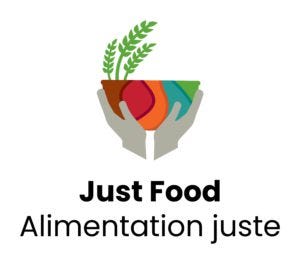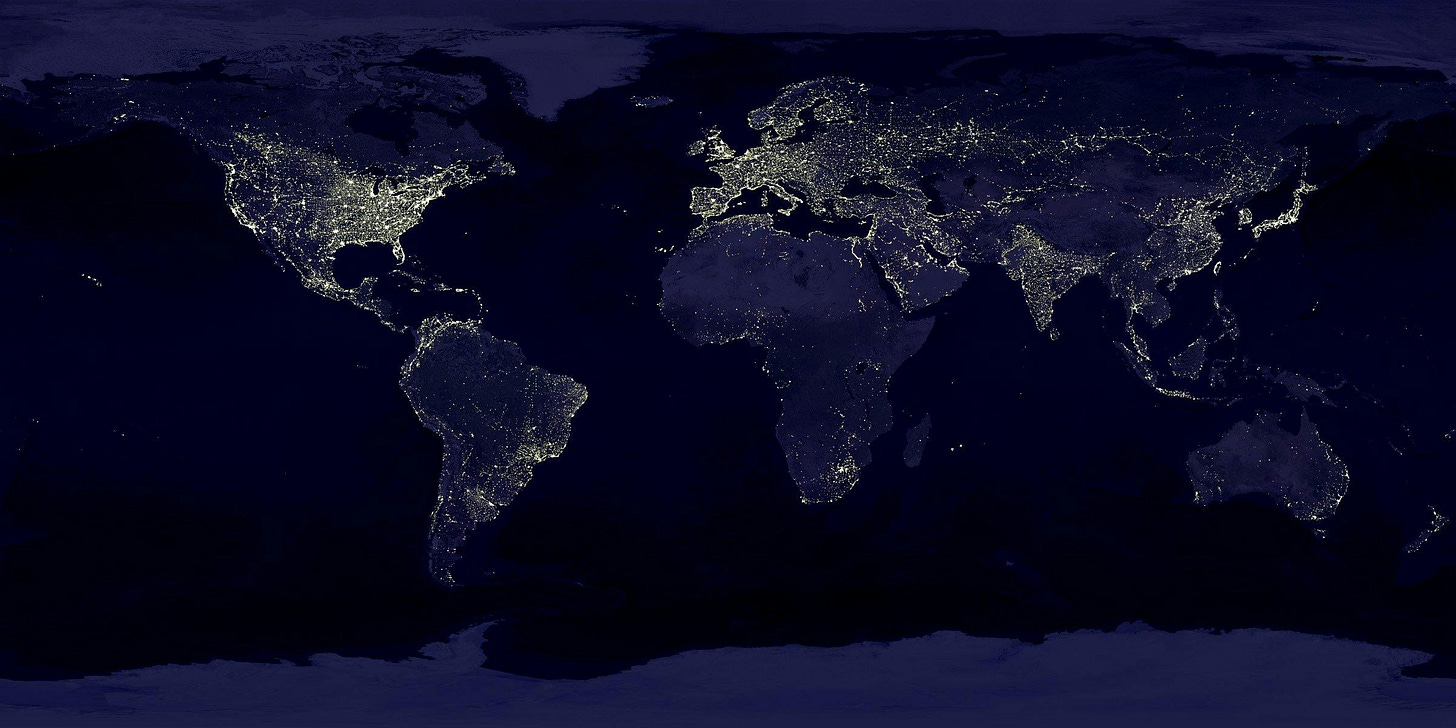Sermon: God So Loved the World
Today's newsletter is unlocked for all subscribers. Please enjoy and share with your friends.
Hey! I’m Jessica, and welcome to my newsletter about faith and climate action. We are in a climate emergency; it’s all hands on deck... Subscribe to join a community of people of faith and like-minded people seeking to make change!
Earlier this week, there was a talk at my daughter’s primary school. Just Food spoke about the value of growing our own food. Kate, the presenter, tailored her talk to both the kids and their caregivers who were invited to come. There was a slideshow presentation talking about what is needed to grow our own food (we need more than soil, water and sun; we need energy, time, access and know-how, too), the difference between fruit and vegetables, and the various ways one can grow food, from window boxes in the kitchen to community garden plots in the neighbourhood.
Just Food is
a local, non-profit, community-based organization that works on both rural and urban food and farming issues in Ottawa and the surrounding region.
Kate gave a great talk from which both kids and adults learned a lot. I found out that there aren’t really any vegetables, per se; it is a term that is used to describe those foods we eat that aren’t sweet. Instead, there are several categories of plant food that we eat: fruit, which has seeds and includes cucumbers and pumpkins as well as oranges and ‘single-seed’ nuts; leaves, such as lettuce and kale; roots, such as potatoes and carrots; and flowers, in which broccoli is included! The tiny little green bits on broccoli turn into pretty yellow flowers if left to their own devices. Discovering that broccoli is a flower was a new learning for me. The presenter also gave us radish, lettuce, cucumber, and pea seeds to grow at home. Better yet, the school had snacks available just for the parents. Adults love snacks too!
The initiative to bring in Just Food came from the School Council, a small team of parents and teachers committed to the school community. The Council applied for and was awarded grant money to invite Just Food to speak. It was a worthwhile effort; Just Food offers an excellent model of community engagement and empowerment that echoes what our neighbourhood school is about.
Just Food describes what it is about on its website:
We envision a vibrant, just and sustainable food system* where:
all people, at all times, have physical and economic access to sufficient, safe, nutritious and culturally acceptable food for an active and healthy life;
essential principles are upheld: ecologically regenerative practices, viable livelihoods for food providers, and social justice for all;
the local population actively participates in the decision-making processes related to food at a municipal, regional, and national levels;
people have the desire, opportunity, and means to actively engage in all aspects of the food system; and
food is celebrated as central to both culture and community.
* The term food system describes the interconnected systems and processes that influence nutrition, food, health, community development and agriculture.
My daughter’s school is rich in diversity: socio-economic, racial, ethnic, and religious diversity, and more. Inviting Just Food to come and speak about growing our own food and how it can contribute to the health and well-being of families and communities was one way in which the School Council affirms and supports such diversity.
Food is life; that is why it is a central metaphor and reality in the scriptures. Your Friday Nudge this week is to check out Just Food! Is there a similar organization in your community? Leave a comment and let us know its name and the community it serves.
Want to support my work but not ready or able to subscribe yet? You can buy me a coffee!
Sermon: God So Loved the World
A sermon preached at the Ottawa Lutheran Church this past Sunday on a popular Bible verse. This sermon is unlocked for all subscribers, so please read and share it widely with your friends and family!
Scripture Reading:
For God so loved the world that he gave his only Son, so that everyone who believes in him may not perish but may have eternal life. (John 3:16 NRSV)
Let us pray: God of Life, may the words of my mouth and the meditations of all our minds and hearts lead us to deeper understanding of you and the love you call us to live. AMEN.
In today’s Gospel we hear one of the most popular verses in the New Testament, John 3:16: “For God so loved the world that he gave his only Son, so that everyone who believes in him may not perish but may have eternal life.”
This verse is everywhere, it seems. It’s on a bumper sticker on the car in front of you as you’re driving to Costco. You can find it on popular Christian gift items, like mugs and t-shirts. In the US at many football games, this verse is quoted, as though somehow Jesus and football are connected.
John 3:16 is a popular verse because it’s been given an easy interpretation, that God sacrificed God’s son Jesus for the sake of our sins, and that if we believe in him, our souls will be saved after we die.
Now, this is only one interpretation of John 3.16, and it is, in fact, both overly simplistic and highly problematic. Did God sacrifice Jesus, or was Jesus executed at the hands of state powers? God didn’t sacrifice Jesus; instead, it was through the power of God’s love for Jesus and all of us that his death, a political attempt to stop his transformative message, was not the end of the Jesus story.
And what is salvation? I can tell you that it is far more hopeful than the overly individualistic interpretation. Throughout the Scriptures, salvation is portrayed far more as a collective experience than an individual one. Salvation is offered because God loved the whole world. The collective. While this salvation is also offered individually, it is most important that it’s also offered collectively, and it is collective belief that brings salvation.
But troubling interpretations aside, have you noticed that only part of this verse tends to get talked about? There is a key part of John 3:16 that often gets overlooked, even on bumper stickers and coffee mugs, at football games and wherever else salvation is sold.
“For God so loved the world that he gave his only Son, so that everyone who believes in him may not perish but may have eternal life.”
For God so loved the world. That part, the beginning of John 3:16, the reason given for why Jesus became incarnate, the reason why we have the Christian story today, that part is rarely talked about.
Although this sermon is free to read, your financial support helps to make it possible for me to do the important work of supporting and inspiring people of faith to take climate action. Consider upgrading to a paid subscription today!
However we interpret what it means that God gave God’s son to the world, however we understand what salvation means for us as Christians, one thing that really matters is why God brought Jesus into the world. What matters is what brought about the Christian story in the first place.
God gave his only Son, to use John’s language, because God loved the world!
We know this because John says so. And we also know this because in Genesis we learn that God created the world, every single part of the world, and called it good. Not just once, but every time God created a part of the world. At the end of each day of God’s creating, God called what God had created good. God looked back at what God had done, and said, “that is good!”
God so loved the world.
So, you would think, wouldn’t you, that we would love the world, too. You would think that if it is good for God, then it is good for us. You would think that if God so loved the world that God brought Jesus into the world and gave us the Christian story of resurrection, that we would love the world, too.
But it seems that we don’t really love the world. Or maybe we just love the parts that are useful to us, like the oil from the ground and the coal from the mountains. We love the trees when we build houses and the fields when we grow food and clear forests to farm beef cattle. We love the oceans when they give us all the fish and seafood we could want, and the air when we can fly through it to go on vacation.
We seem to love the world when it gives us what we want, but we don’t love it enough to set limits on our actions for the sake of the world. We don’t love the world for its own sake, but just for our own. We have a rather utilitarian love of the world, loving what it can do for us. Which, if Jesus’ ministry has taught us anything about love, isn’t really love at all.
We are, after all, in a climate and ecological crisis of our own making, a crisis that is killing the world. Biodiversity loss is killing animals and plants at such a rate that the world is now in its sixth great extinction period, the last being that of the dinosaurs. Air pollution is causing respiratory, cardiovascular and other diseases, as well as destroying the land itself. Plastics are such a scourge that islands of plastic in the oceans are visible from space, and microplastics are now found in blood, breastmilk, and testicles.
And the climate emergency, caused by fossil fuel emissions, industrial agriculture, and our voracious consumerism, has already, at only 1.2 degrees warming, wreaked destruction through melting ice caps, increased wildfires, floods and droughts that are breaking new records every day. If the destruction that we are reading about every day on the news is bad now, just imagine how bad it is going to get if we don’t stop burning carbon, eating so much meat, and consuming so much stuff.
We are destroying the world that God so loved. We are destroying the world that God called good, again and again. For God so loved the world that God gave us Jesus. And yet, we are destroying the world.
We have created a climate and ecological crisis that was entirely preventable, a crisis that is threatening human lives here and around the world, as well as the lives of so many in the natural world, too.
We have treated the world as if it were both a department store and a garbage dump, as though it doesn’t have value of its own. But the world wasn’t created just for us. As God points out in the book of Job, the world was not made for human purposes, but for God’s purposes. And while we can never know what God’s purposes are, we do know that God loved the world – the whole world, the whole entire cosmos – so much that God called it good, and God became incarnate through Jesus Christ. And Jesus, who was fully divine was also fully human. Jesus was fully a part of this world that God created, that God so loved!
And Jesus loved the whole world too, just like God his Father, our Creator did. And Jesus taught us, during his life and ministry, what love is. What love looks like. What love feels like.
Jesus taught us we are to love the world, too, and taught us how to love the world, by teaching us how to love one another. We are to love through compassion and caring for one another. We are to love through acts of justice, peace and mercy. We are especially to love through self-sacrifice, giving of ourselves for the sake of the other. Jesus showed us how to love the world, the world that God so loved that God gave us Jesus, himself.
God didn’t just love the world when God created it, God continues to love the world today.
Through the power of the Holy Spirit present and active in the world, God continues to love God’s good creation.
God so loves the world! With this knowledge and with the power given to us by the Holy Spirit, we can come to love the world, too. We can love the world not in a utilitarian way, loving just the parts we like or need and leaving the rest, but in the way of Jesus. We can love the world in the ways that it needs in order to flourish and be made whole again.
We can love the world the way that Jesus taught us: through care and compassion, peace and justice, and a model of self-sacrifice. Sacrifice for the sake of others.
For God so loves the world, we can stop burning fossil fuels and clearing the Amazon to raise beef and dairy cattle. We can stop using plastics, and we can stop our compulsive consumerism.
So much more is needed to love the world that God loves, in our time of climate and ecological crisis. We need to work for political and social change. We need to fight for the rights of the poor in the global South, and Indigenous communities here in Canada. There is so much to do, and we need to do it today.
It can be so overwhelming, I know. I work in the arena of climate action and Christian discipleship, and so I know very well how much needs to be done, and what an uphill battle it is.
But here is what I also know: we are not doing it alone! We are not alone in our efforts, for we are Christians! We are followers of Jesus Christ, who is the way, the truth and the life (John 14.6). “For God so loved the world that he gave his only Son, so that everyone who believes in him may not perish but may have eternal life.”
My friends, God’s promise to us is not about individual salvation at the expense of the world around us. God’s promise is not a bloody sacrifice that loses its meaning outside of the context of empire and oppression. Instead, God’s promise is of a love that is so big, so vast and unconditional that it floods out from a love for the whole world, a world of galaxies and stars, oceans and whales, inchworms and bacteria. God’s promise is a love for the whole world, a love so big that God brought us Jesus, who was born into the world, died in the world, and is now alive again, both in and beyond the world itself.
And precisely because of Jesus, we are not alone as we learn to love the world, the world that God loves, and take the actions of love that we must take today. As we seek to take climate and ecological action, we do so with the power of the Holy Spirit guiding and empowering us, with the redemption that comes from Jesus Christ, and with the blessing of God our Creator.
For God so loves the world! AMEN.
We can love the world the way that Jesus taught us: through care and compassion, peace and justice, and a model of self-sacrifice. Sacrifice for the sake of others.
What comes up for you as you read this sermon?










Great sermon!